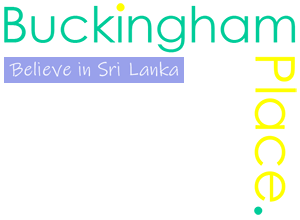GOING ANTI-PLASTIC | Update 2023
12 years ago, the hotel replaced plastic water bottles with refillable flasks. 4 years later we outlawed plastic drinking straws, swapping them for reusable ones. Both initiatives were easily implemented and well supported, and both remain ongoing.
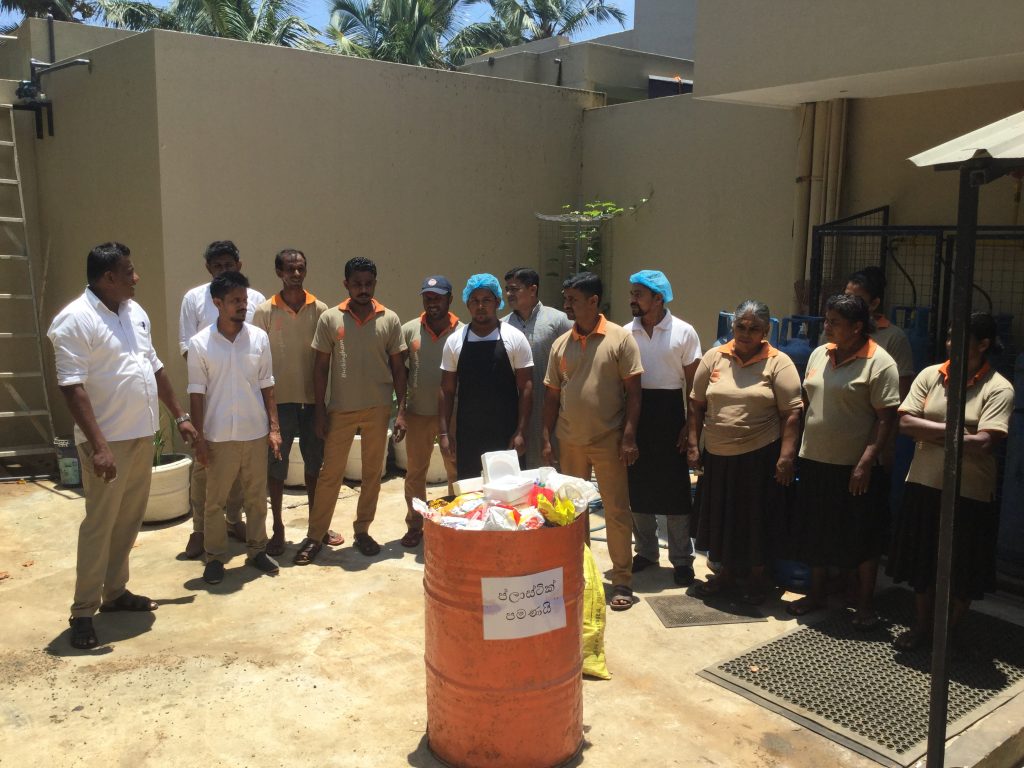 In 2018, believing more could be done, we began a journey to phase out by 75%, the use of plastic and polythene by the end of 2019. We surprised ourselves, reaching this milestone within the year. We began with micro-audits of plastic usage in our bedrooms, bathrooms, restaurant, kitchen and so on, then as a team, used our imagination, resourcefulness and a modest financial outlay to complete the first leg of our journey - frustratingly, to be sent back to square-one by PPE protocols during the pandemic.
In 2018, believing more could be done, we began a journey to phase out by 75%, the use of plastic and polythene by the end of 2019. We surprised ourselves, reaching this milestone within the year. We began with micro-audits of plastic usage in our bedrooms, bathrooms, restaurant, kitchen and so on, then as a team, used our imagination, resourcefulness and a modest financial outlay to complete the first leg of our journey - frustratingly, to be sent back to square-one by PPE protocols during the pandemic.
Undeterred we have restarted our journey. Once again we go shopping with bags made from old cushion covers and, subject to food safety, hand back plastic bags and packaging to bewildered supermarket staff! We stock room fridges with water flasks and fill reusable jars with snacks. Bathroom amenities come in earthenware bottles, we wrap takeaway breakfasts in banana leaves and, kitchen crews have reduced their use of Clingfilm by a staggering 1.5km annually, simply by learning how to use it. Back to normal also means taking 3-4 weeks to fill Plastic Central with waste plastic from around the hotel - before going anti-plastic it took 3-4 days!
We really are trying to help safeguard this islands beauty, biodiversity and fragile food chains however, plastic is a very hard habit to break. We lose focus occasionally, so do feel free to alert to us when we have, while sharing your own ideas and enthusiasm.
Finally, please help if you can, by repatriating plastic you brought with you – it helps enormously.
Thank you
Nick & the Team
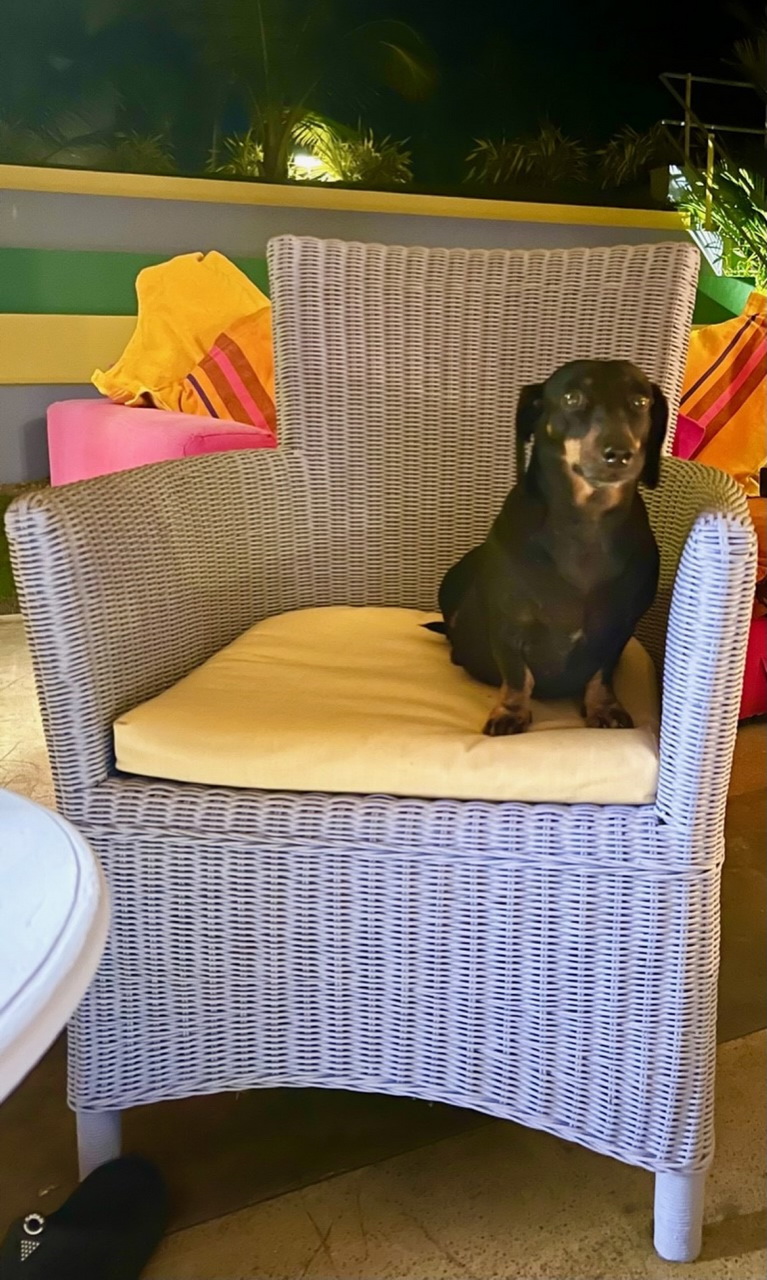 OUR ANIMALS
OUR ANIMALS
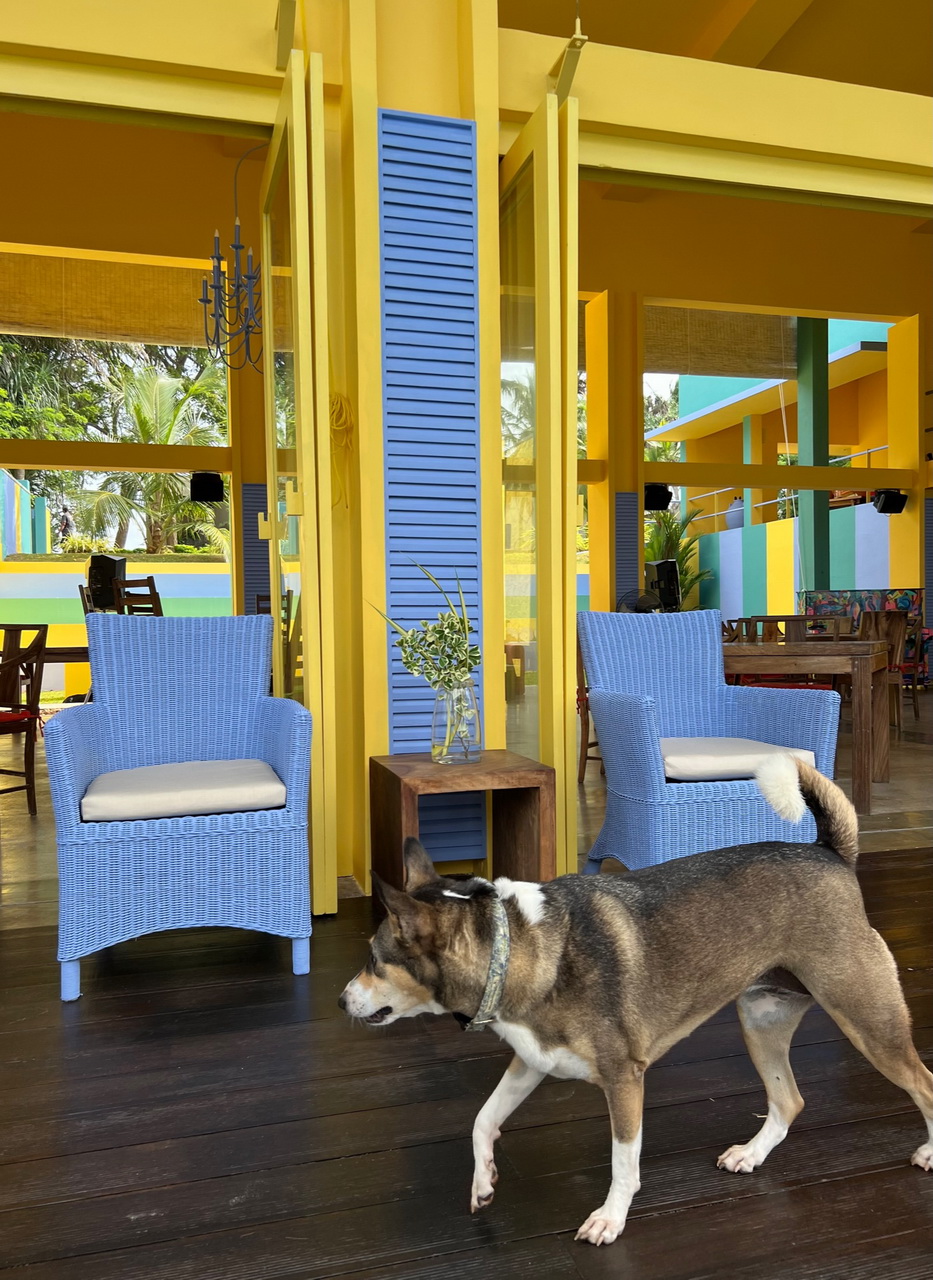 Our own animals are loved, bathed, fed and visited periodically by their good friend the vet.
Our own animals are loved, bathed, fed and visited periodically by their good friend the vet.
Don’t be offended by our dogs, yappy dachshund Gracie-B, and Bella Fontella. Gracie barks incessantly at EVERYONE even us, but don’t be nervous. she hasn’t bitten a soul and can be adorable on her terms.
Typically non-aggressive Grey Langur monkeys are hugely entertaining and 100% wild so don’t feed them please. Sharing our habitat with ‘the relatives’ is a joy and great privilege, but we remember they once owned it and still do to a large degree.
Please rest assured, nothing is loafing around in the garden waiting to bite you. Anything you might meet will be equally or more afraid of YOU.
SHARING OUR SANCTUARY
 Whilst we feel privileged sharing our space with its wildlife, we recognise the unknown can cause undue concern for some. However, commonsense is generally adequate protection from wildlife encounters and irritants, while animal/eco-friendly controls and innovative measures play a big part too. Without being flippant, the first thing you’ll notice is that I’m still here - after 22 years, having experienced no more than occasional insect bites and a couple of bee stings.
Whilst we feel privileged sharing our space with its wildlife, we recognise the unknown can cause undue concern for some. However, commonsense is generally adequate protection from wildlife encounters and irritants, while animal/eco-friendly controls and innovative measures play a big part too. Without being flippant, the first thing you’ll notice is that I’m still here - after 22 years, having experienced no more than occasional insect bites and a couple of bee stings.
Larger wildlife is afraid of us and keeps out of our way, and adopting sensible tropical habits, such as keeping windows closed overnight, switching lights off in an open-air bathroom when not using it, are advised. Please don't leave food out for the monkeys, however cute they may be!
Our tropical garden is natures’ sanctuary. Various reptiles and unusual looking mammals and birds are fascinating to study. To avoid surprises at night use a torch in the garden and follow pathways, and obviously don't touch the wildlife - it may not like it. For perspective, whenever I’m on holiday in the South of France, mosquitoes will irritate me much more there than they do all year-round at the hotel.
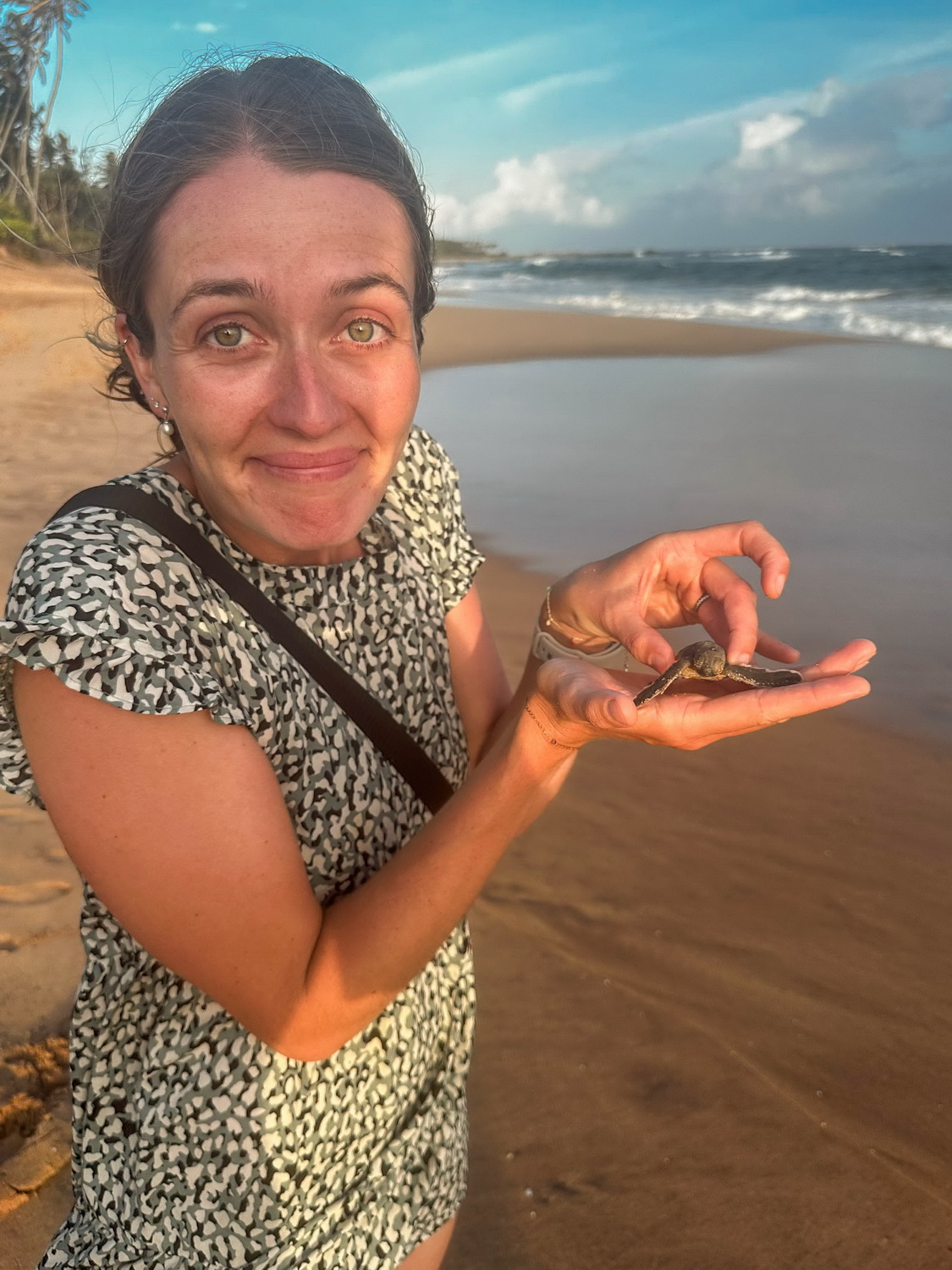
SEA TURTLES
Buckingham Place is situated on the edge of a nature sanctuary and prime nesting beach for sea turtles. During daylight hours, beach visitors can roam freely, and if lucky, witness turtle hatchlings heading for the sea. After dark, for the sake of nesting turtles, beach access is necessarily supervised by wildlife rangers and village nest-protectors who operate a night-watch project funded by visitor donations.
Whilst we support the concept, feedback suggests the project can struggle with visitor numbers at times, therefore we invite you to discuss the topic further when with us. If you visit the project (from around 8.30pm) please take your donation (circa US$5 per visitor), keep an open mind and remember, these amazing creatures have been visiting Rekawa longer than us.
Important note; to avoid disturbing night-watch activities we lock our beach gate after dark, also, conservationists advise torches, mobile phone lights, bright clothing, noise and close proximity to turtles may adversely impact their habitual return.
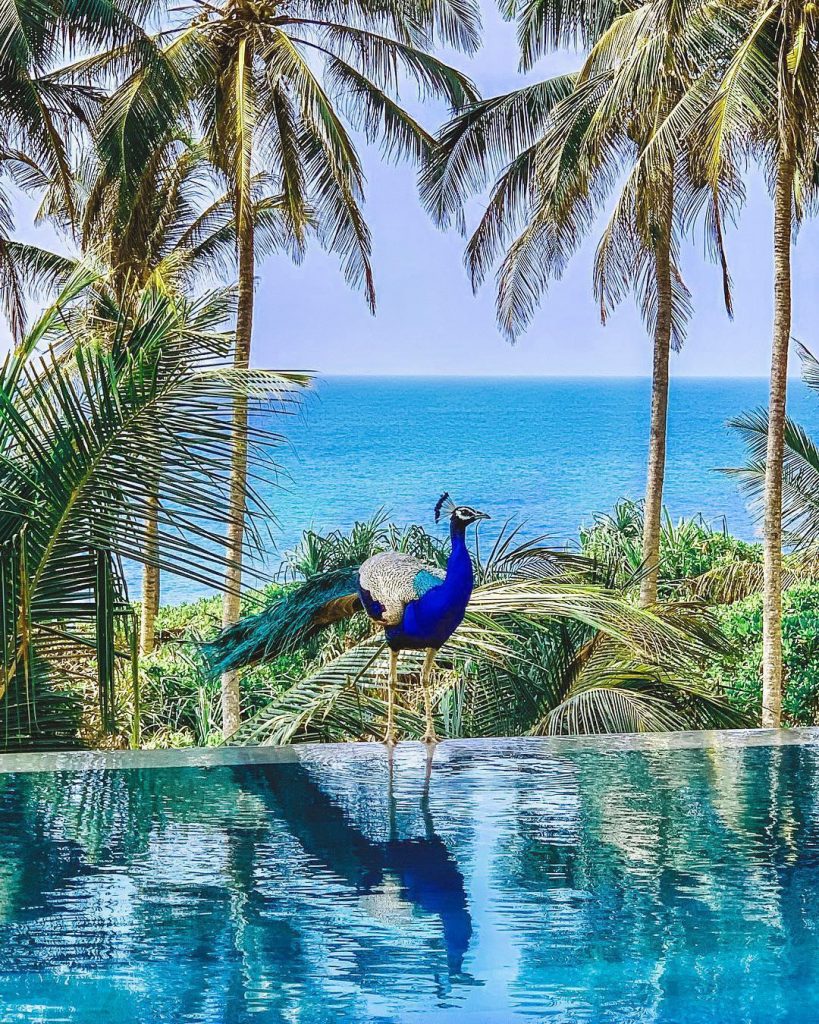 AMAZING BIRDLIFE
AMAZING BIRDLIFE
Great guests and keen birders, Tony McGhee (Dec 2011) and Jane Poyntz (Feb 2022), left exhaustive notes for those following in their footsteps, of birds and other wildlife spotted in our gardens and nearby. Most sightings were at or within 4 kilometres of Buckingham Place; on ponds, lakes, beaches and the lagoon.
Immense thanks to Tony and Jane, both of whom wished fellow enthusiasts good luck!
Little Cormorant, Indian Cormorant, Great Cormorant, Spot Billed Pelican, Yellow Bittern, Indian Pond Heron, Black Crowned Night, Great Heron, Little Heron, Purple Heron, Eastern Cattle Egret, Little Egret, Intermediate Egret, Great Egret, Black Headed Ibis, Lesser Whistling Duck, Eurasian Widgeon, Pygmy Goose, Garganey Duck, Original Honey Buzzard, Black Shouldered Kite, Common Kestrel, Brahiminey Kite, White Bellied Sea Eagle, Booted Eagle, Pallid Harrier, Green Billed Coucal, Indian Swiftlet, Stork Billed Kingfisher, White Throated Kingfisher, Black Capped Kingfisher, Common Kingfisher, European Bee Eater, Chestnut Headed Bee Eater, Yellow Crowned Woodpecker, Black Rumped Flame Back, Barn Swallow, Woolly Necked Stork, Common Lara, Original Magpie, Robin, Indian Robin, Rose Ringed Parakeet, Layards Parakeet, Asian Koel, Darter, Yellow Eared Bul Bul, Great Knot Sanderling, Jeydons Bush Lark, Bar Winged Flycatcher, Shrike, Red Vented Bul Bul, Eurasian Blackbird, Black Bul Bul, House Crow ,Lesser Crested Tern, Pied Bush Chat, Common Moorhen, White Breasted Water Hen, Indian Peafowl, Ceylon Jungle Fowl, Orange Headed Thrush, Yellow Wattled Lapwing, Red Wattle Lapwing, Pacific Golden Plover, Little Ringed Plover, Kentish Plover, Indian Thicknee, Common Tern, Gull Billed Tern, Black Headed Gull, Whimbrel Bar Tailed Godwit, Pintail Snipe, Blue Rock Thrush, Common Mynah Bird, House Sparrow, Indian Jungle Crow, Water Cock, Purple Swamp Hen, Grey Crested Pinia, Tickells Blue Flycatcher, Lotens Sunbird, Curlew Sandpiper, Little Stint Lesser Hill Mynah, Asian Paradise, White Bellied Drongo, Eurasian Collared Dove, Black Spotted Dove, Hooded Oriole Flycatcher, Black Drongo, Sri Lankan Wood Pigeon. *Plus Iguanas Fruit Bats Numerous Bat Species Local Monkey Troupes (Langur) Monitor Lizards (Up To 2m!)
Additional sightings by Jane:
White-Browed Bulbul, Orange-Breasted Green Pigeon, Coppersmith Barbet, Pheasant-Tailed Jacana, Blue-Tailed Bee Eater, Brown-Headed Barbet, Green Imperial Pigeon, Green Bee Eater, Yellow-Billed Babbler, Scaly-Breasted Munia, Changeable (Crested) Hawk-Eagle, Purple Sunbird, Greater Coucal.
